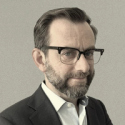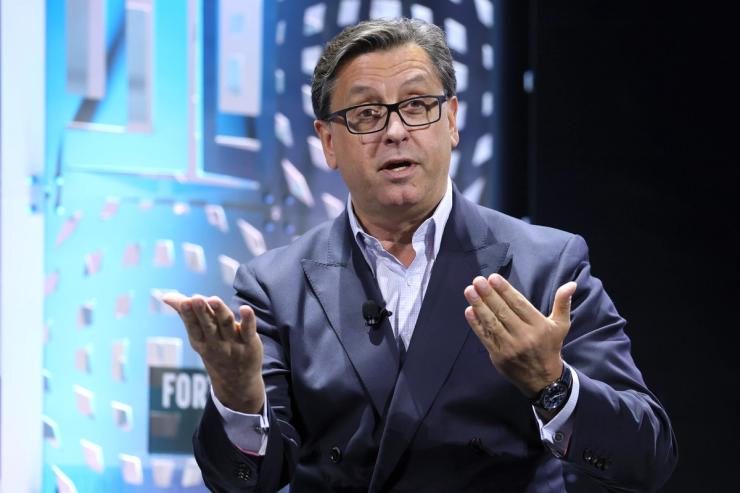The Signal Interview
Paul Hudson has a blunt view of peers who hand off the execution of their artificial intelligence strategy to their chief digital officer.
“Idiots,” Sanofi’s chief executive scoffs.
He hastens to add that he has a great CDO, but says people in such roles get bogged down by the technical aspects when told to lead a company’s AI strategy. “Five years go by, nothing happens,” he says. The lesson for CEOs? “You don’t delegate the revolution.”
Hudson, who became the drugmaker’s CEO in 2019 after leadership roles at Novartis and AstraZeneca, is on a mission to turn “a French dinosaur” which had “no R&D focus” into a research and development-driven leader in immunology. Creating an AI-powered innovation culture is central to his plans, but his reluctance to delegate does not stem from mastery of the technology.
“I have no interest in AI and I don’t understand it,” he says, “but what I discovered a few years ago was that the AI was better at telling me what would happen next than our own people.” The bots could just synthesize insights from many more smart people, he notes.
Sanofi has partnerships with the likes of OpenAI, but instead of spending heavily on a centrally directed AI rollout, Hudson is counting on what he calls his “AI Fight Club.”
Driving ROAI from employees disrupting themselves
“We just picked one person who didn’t know anything about AI from each major function and put them in a room together and said, ‘OK, disrupt yourselves,’” Hudson explains. Rather than checking on their progress frequently or giving them detailed directions, he just told them they would gather once or twice a year.
Hudson is a believer in “event-driven leadership,” he says, explaining that this means giving people a fixed goal, but plenty of freedom about how to reach it.
“You tell them, ‘We’ll meet in Berlin in September and you’ll share your updates with each other.’ No more instructions, no questions asked between now and then. It becomes incredibly empowering and motivating for people to fill in the gap,” he says, because nobody wants to show up with no progress to report.
Fight Club’s members share their findings with their teams, and with each other, allowing Sanofi to prevent its AI skills from developing in silos. This cross-fertilizing approach has delivered “wins we never thought were possible,” he says, and focused him on the notion of ROAI — return on artificial intelligence.
Beating corporate lethargy with radical transparency
Hudson has raised Sanofi’s R&D budget from €5 billion a year to €8.5 billion. He also reduced headcount, but he knows that he cannot drive returns on that investment just from cutting costs. “I can’t fire enough people to generate enough cost saving[s] to discover new medicines fast enough,” he says. “What I can do is weaponize the people to use AI to think bigger than they’ve ever thought, to discover new medicines faster.”
Hudson now starts drug development committee meetings with an AI agent’s assessment of whether a drug should advance to the next phase of trials or not. The agent will not just give its answer to that question, but weigh the drug’s prospects against others in Sanofi’s pipeline — and against alternative potential uses of Sanofi’s capital.
It gives its view dispassionately, whether executives like it or not, Hudson notes, “because the agent doesn’t have a career at stake.”
Most big companies get lethargic and resist change, Hudson believes, but AI “blows fresh air through everywhere.” Employees who don’t want AI agents judging them harshly are raising their games, he says, making the technology’s “radical transparency” a “multiplier” of his change agenda.
Ties, pizza, and the purposeful symbolism of culture change
Hudson is a Manchester-born economics graduate who saw Oasis in his hometown when the band was still playing in small venues and describes the Mancunians’ current tour as “life changing.” He worked for what was then Sanofi-Synthélabo in the mid-1990s, so he knew the company years before becoming its CEO, but he has brought an iconoclastic approach to its Paris headquarters since returning.
The company seemed “lost in time” when he returned, he says. His assistant wanted to call him Monsieur Directeur Général, his chairman gulped at hearing that Hudson would not be wearing a tie, and he couldn’t get daily sales reports. At lunchtime, executives enjoyed a dining room on the building’s roof, while staff were stuck in a windowless basement canteen with a dated menu of coq au vin and boeuf bourguignon.
Hudson moved into new premises with no executive dining room, gave staff a view of the Paris rooftops, and turned the cafeteria into a pizzeria. They were symbolic gestures, but his intention was to be “purposeful in the symbols, helping people understand that the sands are shifting and it would not go back to how it was.” The risks from shaking things up were much lower than the risk of staying the same, he concluded, “so we were able to get on with it.”
How to avoid spreading resources ‘like Nutella’
Pizza and open-neck shirts would not deliver the breakthrough innovations Hudson needed, however, and he declared in 2023 that he was focusing Sanofi on becoming the world’s leading immunology company. It already had Dupixent, a medication for conditions including eczema, which he says could become one of the five best-selling drugs of all time, so this looked like a category where it could win.
But big companies hate prioritizing, Hudson says. Instead, “they spread resources like Nutella.”
The reason is that focusing on one team’s work means starving others of resources. That was a lesson he learned at a previous company, when “five guys blocked me from leaving the bathroom” after he said in a meeting that he would not prioritize the medicines they were working on. He talked his way out of the bathroom, returned to the meeting, and said, “I’ve got my first five names for the people who don’t want to participate in the future.”
Talent management and resource allocation are at the core of the CEO’s role, Hudson notes. “If I put the best people on the right opportunity with the right resources, we can win.” But too many staff doubted that Sanofi could win in R&D — so he needed to bring in outsiders who “know what success looks like.”
Hudson recruited such people from around the world to work on Dupixent, telling them “they could take risks on the diseases that they could go after with this drug” and counting on AI to help point them to which risks were most likely to pay off. “We needed to be able to tell people that we were serious about doing R&D. If we got it right, we’d be this amazing growth story,” he says. “And if we got it wrong, we’d be about where we started.”
How a vaccine leader navigates the politics of vaccine sceptics
Sanofi’s status as one of the world’s largest vaccine makers places it at odds with Robert F. Kennedy Jr., President Donald Trump’s health secretary, who has repeatedly voiced doubts about the safety of vaccines. Yet Hudson has been among the foreign CEOs pledging large US investments since Trump’s inauguration, promising to invest at least $20 billion in the country by 2030.
The decision was a calculated one, he implies. “Pharma’s been outside of tariffs, and there was a lot of talk of whether that would stay the same. We took the opportunity to declare our investment so the president could see that we were serious about it.”
Hudson will take over next year from Pfizer’s Albert Bourla as chair of industry lobby group PhRMA, and he shares Bourla’s belief that the industry must engage with the administration, however profound its differences are.
“Every administration has a certain flavor, and you have to find a way. I think not dialoguing makes that harder and unnecessarily so. We don’t always agree. I don’t agree with Bobby Kennedy’s view on vaccines in certain places,” he says. Hudson’s approach has been to “stick to the facts” in discussions with administration officials. “Theoretically, you can’t debate the facts. They try.”
Hudson has found Kennedy more amenable, more thoughtful, and smarter than he had expected. But Kennedy has a “blind spot,” Hudson says, where his views were “non-negotiable” and the facts “suddenly became less pertinent.”
“I know for sure he vehemently believes in everything that he’s saying, even if we raise eyebrows. So what we need to get to is a solution where he gets what he wants and we get what we want, which is principally [that] patients who need their lives protect[ed] with a vaccine can get it,” Hudson says, calling Kennedy “a new lens for us.”
“His view that parents should have the choice whether to vaccinate, it doesn’t work like that. You need everybody [to be vaccinated],” he says, adding: “We never thought we’d have to justify these things.”
As Sanofi looks for areas of common ground with US regulators, Hudson is leaning into Kennedy’s Make America Healthy Again motto. “It’s good to make America healthy again. It’s good to work on prevention,” he says. “That includes vaccines.”
His aim is to encourage people to be open-minded in such debates, he says. “We won’t win them all. I think we are aware of that.”
Sleeping soundly on a rollercoaster ride
The changes that Hudson has ushered in have yet to transform Sanofi’s stock, which stands roughly 10% below where it was five years ago. The share price chart reflects “the roller coaster of trying to modernize an old French dinosaur,” he says, adding that sector-wide underperformance and “a European discount” have played a part.
Sanofi’s US investments will not come at the expense of its home market, Hudson insists, but he is frustrated with Europe’s reluctance to help the pharmaceutical industry, the source of its biggest category of exports. Still, he says he has no plans to move Sanofi’s listing to the US.
After reporting double-digit sales growth in its latest quarter, “we’re now at a point where we think that the successes are about to accumulate,” he says. But he also knows that investors still need convincing that Sanofi can become a sustainable growth business.
Doubtful shareholders marked the stock down sharply in 2023 when Hudson announced his R&D spending plans. But he was taken aback when a television news anchor asked the following year how he could sleep at night after provoking such a response.
“I slept very well because it was the right decision,” he says. “We’ll still get to see whether I’ll face the guillotine, but I know that the choices we made put the company in a position to win that it had never been in before.”
Notable
- Shares in Sanofi and other drugmakers dropped recently after Trump told them to cut the prices they charge Medicaid for drugs to match lower prices in other countries.
- Hudson starts his day with an internal app that points out upcoming threats and opportunities. “I used to fly around the world and ask people questions to try and organize myself on this. Now I can see it all with a cup of coffee,” he told The New York Times.


